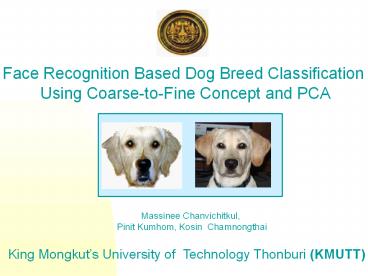Face Recognition Based Dog Breed Classification - PowerPoint PPT Presentation
1 / 21
Title:
Face Recognition Based Dog Breed Classification
Description:
Face Recognition Based Dog Breed Classification Using Coarse-to-Fine Concept and PCA Massinee Chanvichitkul, Pinit Kumhom, Kosin Chamnongthai – PowerPoint PPT presentation
Number of Views:245
Avg rating:3.0/5.0
Title: Face Recognition Based Dog Breed Classification
1
Face Recognition Based Dog Breed Classification
Using Coarse-to-Fine Concept and PCA
Massinee Chanvichitkul, Pinit Kumhom, Kosin
Chamnongthai
King Mongkuts University of Technology Thonburi
(KMUTT)
2
Presentation Outline
- Abstract
- Motivation
- Problem Analysis and Basic Concept
- System and Method
- Experiments and Results
- Disscussion
- Conclusion
3
Abstract
- There are 154 dog breeds, and some are similar in
face configurations - We propose a modified PCA-based method to
classify dog-face images. Classification
tolerances among dog-face images are widened by
coarse-to-fine concept. In coarse classification,
12 patterns of dog-face profile are employed to
group dog faces. - PCA is then used as a tool for fine
classification in each group - The experiments show that the accuracy of the
proposed system is better than the PCA-based
classifier. The improvement is around 20
approximately.
4
Motivation
- Dogs have been the most favorite and popular pet
of humans According to American Kennel Club
(AKC), there are more than 154 dog breeds and
some are similar in face configurations e.g.
Labrador, Golden, German shepherd, and so on - Dogs need a specific treat due to their breed, we
have to recognize dog breeds in order to
appropriately care and cure. - Thus an automatic dog breed classifier can be
used as a standalone classification tool or an
assistant to the experts in giving essential
information for speeding up the classification
process
5
Problem Analysis and Basic Concept-I
- Unlike human face classification, a variety of
dog faces could be grouped by using ear profile
and face profile patterns. - This paper would refer ear and face profile
patterns as a global feature. - Categorized by ears, dog breed can be divided
into two groups, i.e. Standing Ear and Dropped
Ear - From face profile, dog breed can be divided into
six patterns, i.e. Square, Ellipse, Trapezoid,
Circle, Traingle and Hexagon patterns. - Totally, there are twelve groups of ear and face
profiles.
6
Problem Analysis and Basic Concept-II
In Coarse classification grouping dog breeds
into 12 groups using ear and face profiles.
Ear profile
Face profile
7
Problem Analysis and Basic Concept-III
- In Fig. 1, the Fig. shows that we can classify
two of dog faces (Miniture and Dollberman) by ear
profile feature (standing ear or dropped ear).
Figure 1 Example of dog images are in the
different group
8
Problem Analysis and Basic Concept-IV
- In Fig. 2, the Fig. shows that we can classify
two of dog faces (Englishfog and Harley) by face
profile feature (Triangle-like or Circle-like
face)
Figure 2 Example of dog images are in the same
group
9
Problem Analysis and Basic Concept-V
Table I three examples of grouping dogs by face
and ear profiles
SE-TR
DE-CI
DE-TR
10
- From the basic concept, we would be able to
construct the proposed system for classifying dog
face images as shown in Fig. 3.
11
Proposed system-I
Figure 3 the proposed system
12
Proposed system-II
Figure 5 PCA-based Fine classification
Figure 4 Contour-based Coarse classification
13
Proposed system-III
- Step 1 Input a dog face image.
- Step 2 Finding the image contours.
- Step 3 Classifying the input image using
- the Fourier descriptor.
- Step 4 Deciding the group of a dog face image.
- Step 5 Classifying a dog face image using the
PCA-based classifier.
14
Experiments Results-I
The example of coarse classification of the SE-SQ
template
Figure 6 (a) the image curvature x and y
15
Experiments Results-II
Figure 6 (b) the frequency spectrum of the
curvature x and y
16
Experiments Results-III
Figure 8 (a) The coarse classification of the
english toy terrier face the image contours x(k)
and y(k)
Figure 7 (a) The coarse classification of the
doberman face the image contours x(k) and y(k)
17
Experiments Results-IV
Figure 7 (b) The coarse classification of the
doberman face the frequency spectrum of the
image.
Figure 8 (b)The coarse classification of the
English Toy Terrier face the frequency
spectrum of the image.
18
Table 2. shows the results of the proposed method
comparing with a PCA-based classifier shows the
classification results of the proposed classifier
comparing with the PCA-based classifier.The
classification improvement is around 20
approximately.
Experiments Results-V
Breeds Sample PCA () Proposed () Improvement ()
Minature paniture 8 66.7 87.5 20.8
Minature terrier 8 66.7 87.5 20.8
Beagle 8 75 87.5 12.5
Golden retriever 8 66.7 87.5 20.8
Labrador 8 66.7 75 8.3
English toy terrier 7 71.4 85.7 14.29
Chihuahua 7 66.7 85.7 19.01
Doberman 7 66.7 85.7 19.01
Shiba inu 6 66.7 83.3 16.63
Siberian husky 6 75 83.3 8.33
19
Conclusions
- This paper presents the classification of dog
breed images using the coarse-to-fine approach.
In order to achieve the coarse-to-fine
classification concept, the contour-based
classifier and the PCA-based classifier are used
as the coarse classifier and the fine classifier
respectively - In the experiments, 73 of dog face images are
tested with the proposed classification system
comparing with the PCA-based classification
system - The experiments show that the accuracy of the
proposed system is better than the PCA-based
classifier. - From Table2, the improvement is around 20
approximately.
20
Discussion
Bulldog
Bulldog
When we classify using coarse classification two
images are in different groups, thus the accuracy
of the system would be decrease.
21
Thank you for YourAttention !
The End































